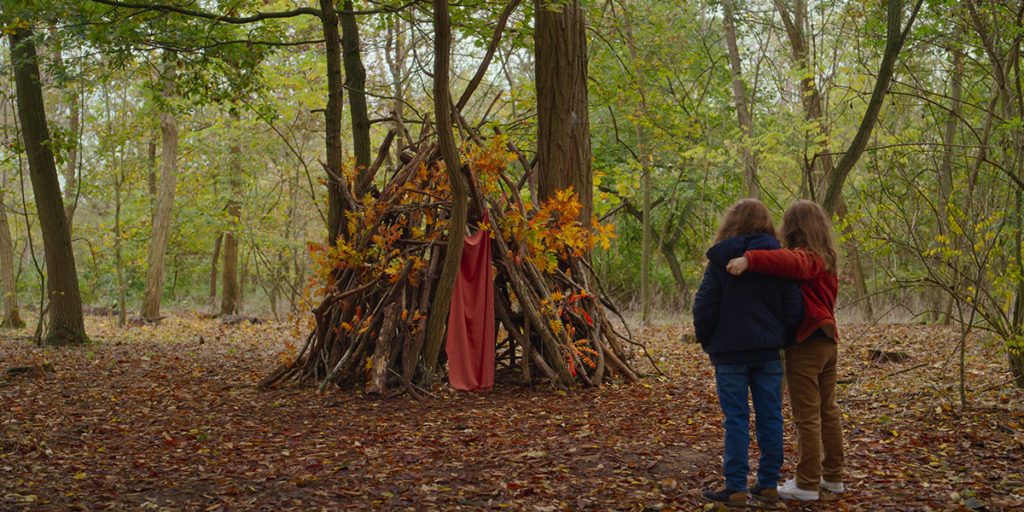Petite Maman

Image courtesy TIFF.
It’s an indelible truth of the human condition that although we may hurtle towards the seeming inevitability of one day becoming our parents, we can never fully know who they were prior to our existence. What kind of people were they before their life’s priorities forever shifted? What now-evaporated dreams did they once cherish? If, as children, we had the opportunity to encounter them in the hypothetical hallways of a school caught in a temporal paradox, would we befriend them?
Céline Sciamma’s PETITE MAMAN posits this age-old question and delicately examines one possible answer. Eight year old Nelly (Joséphine Sanz) handles the death of her grandmother with a maturity beyond her years. After bidding farewell to the nursing home denizens whom she’d befriended over the proceeding months, she accompanies her parents to her mother’s childhood country home. It’s empty, yet filled with everyday clutter and lingering memories. Melancholy accompanies Nelly’s mother (Nina Meurisse) as she thumbs through her old elementary school notebooks and gathers the last vestiges of her own mother’s life into boxes.
Requiring space from such emotionally draining labor, Nelly ventures into the woods outside. There, she stumbles upon a girl in the midst of building a fort with some fallen trees. The stranger introduces herself as Marion (Gabrielle Sanz); she’s not only Nelly’s exact age but also an unsettling doppelganger. While in the woods, Nelly and Marion inhabit a nexus point where they can lead the other back to their own respective time period. When Marion invites Nelly, the familiar house is vibrant with life, existing twenty odd years in the past. When Nelly invites Marion, it’s haunted by the memory of the matriarch who’d lived there.
The choice to cast a set of identical twins to play Nelly and Marion fascinates me, as people rarely resemble their parents to such a startling degree. Perhaps it serves as a visual allusion to the uncanny similarity of their personalities, or as a subconscious cue for the audience to divine their familial connection before it’s explicitly revealed. It requires a suspension of disbelief when neither Marion’s mother nor Nelly’s father display any shock at encountering their daughter’s carbon copy.
Nelly and Marion remain synchronized to one another in almost every respect; both are observant and thoughtful, and speak with specific intent. They devise a game where they assume the identities of multiple, elaborately-conceived characters. The play-acting allows them to convey ideas and emotions on a level that would elude them without the conduit of the fantasy enabling it.
When Nelly reveals the truth of her identity, Marion accepts the explanation with an ease that suggests she was already instinctively aware. She questions Nelly about her future and receives answers with the kind of frank honesty that only a child can provide. Nelly worries about her mother’s lingering malaise, something she fears she caused. “You were young when you had me,” she tells Marion, who rejects the idea with an eerily mature response, “You didn’t invent my sadness.”
The moment stirs us profoundly, and provides further insight into why twin sisters were cast. Some connections are so immediate and cell-deep they’re impossible to replicate. Two girls reach across the chasm of time and truly see each other. One will grow up with the foreknowledge of her daughter’s existence, the other will possess a new understanding of who her mother is. Sciamma’s film is a tender thought experiment imbued with a longing that every one of us can relate to.